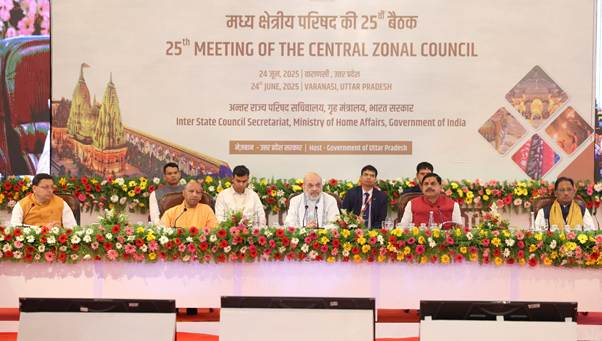Amit Shah Chairs 25th Central Zonal Council Meet in Varanasi: Focus on Unity and Development
Shri Amit Shah opened the proceedings by moving a resolution commending the resolute leadership of Prime Minister Narendra Modi and the valour of the Indian Armed Forces.

- Country:
- India
Union Home Minister and Minister of Cooperation, Shri Amit Shah, presided over the 25th meeting of the Central Zonal Council in Varanasi, Uttar Pradesh. The high-level meeting aimed at fostering stronger inter-state coordination, reviewed key development issues and cooperative governance strategies among the central Indian states.
The meeting witnessed the presence of notable dignitaries, including:
-
Uttar Pradesh Chief Minister Shri Yogi Adityanath
-
Uttarakhand Chief Minister Shri Pushkar Singh Dhami
-
Madhya Pradesh Chief Minister Dr. Mohan Yadav
-
Chhattisgarh Chief Minister Shri Vishnu Deo Sai
Accompanying them were senior ministers from member states, Union Home Secretary, Secretary of the Inter-State Council Secretariat, Chief Secretaries, and top officials from key central ministries and departments.
A Salute to National Leadership and Armed Forces
Shri Amit Shah opened the proceedings by moving a resolution commending the resolute leadership of Prime Minister Narendra Modi and the valour of the Indian Armed Forces. The resolution was passed unanimously, setting a tone of national pride and unity across party and state lines.
Zonal Council as a Beacon of Cooperation
In his keynote address, Shri Shah emphasized the unique status of the Central Zonal Council. He proudly declared that no disputes or unresolved issues exist among its member states — a testament to the region’s harmonious collaboration. He linked this cooperative spirit to the larger vision of "Viksit Bharat@2047", underscoring the region's pivotal role in the national development trajectory.
Progress in Council Activity: Doubling of Meetings and Resolutions
Highlighting the reinvigoration of the Zonal Councils under Prime Minister Modi’s leadership, Shri Shah noted a dramatic increase in engagement:
-
2004–2014: 11 Zonal Council meetings and 14 Standing Committee meetings
-
2014–2025: 28 Zonal Council meetings and 33 Standing Committee meetings
This surge in activity has resulted in the resolution of 1,287 issues, a landmark in collaborative federal governance. Shri Shah called this achievement both “historic” and “encouraging,” reflecting the Centre’s commitment to regular, action-oriented engagement with the states.
Major Issues Discussed: Governance, Infrastructure, and Social Welfare
The meeting deliberated on 19 crucial issues, covering a broad spectrum of national and regional importance. Key areas of focus included:
-
Fast Track Special Courts (FTSCs): Emphasis on their establishment for swift adjudication in cases involving crimes against women and children.
-
Financial Inclusion: Deployment of brick-and-mortar bank branches to ensure coverage within a set radius of every rural village.
-
Emergency Response System (ERSS-112): Review and acceleration of the nationwide implementation for emergency services access.
-
Malnutrition Eradication: Targeted state-level strategies to combat child malnutrition with measurable results.
-
School Dropout Rates: A call to bring the school dropout rate down to zero, especially in tribal and backward regions.
-
Strengthening Cooperatives: A push to expand and modernize the cooperative sector, aligning it with the Ministry of Cooperation’s development goals.
-
Panchayat Empowerment: Shri Shah urged the states to formulate revenue rules for Gram Panchayats, noting that financial independence at the grassroots is crucial for deepening democratic governance.
Legal Framework and Functioning of Zonal Councils
The Zonal Councils, established under Sections 15 to 22 of the States Reorganisation Act, 1956, are formal platforms for inter-state dialogue. Chaired by the Union Home Minister, each council includes:
-
Chief Ministers, Lt. Governors, and Administrators of member states and UTs
-
A rotating Vice-Chairperson, selected among member CMs
-
Two nominated ministers from each state
-
Permanent Committees headed by state Chief Secretaries
Issues raised by states are first examined by the Permanent Committee and later deliberated in full council meetings. This two-tier approach allows for detailed, pre-structured discussions, enabling consensus and coordinated action.
Cooperative and Competitive Federalism: A Shared Vision
Echoing Prime Minister Modi’s principle of “cooperative and competitive federalism,” the Central Zonal Council continues to be a model for inter-state synergy. Shri Amit Shah reaffirmed the belief that “strong states make a strong nation,” and councils like these are vital mechanisms to address regional development issues, prevent conflict, and build trust.
Track Record of Success: 62 Meetings in 11 Years
Since 2014, 62 combined meetings of Zonal Councils and their permanent committees have taken place — a robust demonstration of political will and administrative engagement across party lines. These platforms have helped resolve infrastructure concerns, law and order issues, and policy implementation hurdles, particularly in overlapping jurisdictional areas.
An Agenda for Inclusive Growth
As the 25th Central Zonal Council meeting concluded, it marked not just the resolution of inter-state administrative issues, but a reaffirmation of India’s democratic strength. With national leadership, state partnership, and administrative rigor, the council continues to pave the path for an inclusive, united, and developed India by 2047.
ALSO READ
Rebuilding the Base: Congress' Strategic Move in Uttar Pradesh
Gwalior Cheetahs Roar to Victory with Power-Packed Performance in Madhya Pradesh League
Tragic Lightning Strikes Claim Lives in Madhya Pradesh
Benzene Spill Shuts Down Highway in Madhya Pradesh
Ambedkar Statue Controversy Sparks Political Clash in Madhya Pradesh










